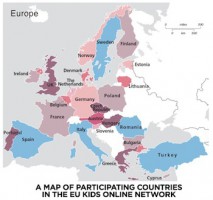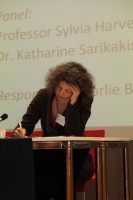Newsroom
Risks, Opportunities, and Realities of Children’s Internet Usage
A Few Moments with Sonia Livingstone

As Social Psychology Professor and Head of the Department of Media and Communications at the London School of Economics and Political Science, Sonia Livingstone is one of the most respected researchers in the growing sector of children’s online risk and safety. Livingstone directs LSE’s research project, EU Kids Online, a 25-nation thematic network funded by the EC’s Safer Internet Programme looking at children, young people and the Internet in an effort to supply policy makers with the best possible advice on how to educate and protect against online risks and opportunities. This past September, she and members of her network released one of the largest studies of its kind to date, Risks and Safety on the Internet, a detailed, face-to-face survey, which interviewed 25,000 European children and their parents across 25 countries. The report exposes the top ten myths of internet safety for children to demonstrate how people’s knowledge of online dangers for internet users ages 9-16 is out of date. Livingstone serves on the Executive Board of the UK’s Council for Child Internet Safety and is also a network member on the Digital Media and Learning Research Hub’s newly created research network on Connected Learning. We spent a few moments speaking with her about her multi-stakeholder approach to researching and what the final report means for parents, policy makers, and industry leaders.
“Talk of digital natives obscures children’s need for support in developing digital skills.” What led to this finding?
In a way, it’s protective as well as empowering to say that young people have this fantastic new set of digital skills. Of course, some of them are very creative and participatory, but every time I do a survey, I find that they are few and far between. Many children are not being creative. They download from YouTube but they don’t upload to YouTube. They look at things on the web but don’t leave comments. They certainly don’t post blogs. There’s a conception that if young people know everything, we are not needed as resources, and they don’t need our help. I really want to contest that conclusion in terms of policy implications. They talk up what they know, but there are many ways in which they need support.
What first triggered me to think about this was when I was literally sitting down with children in front of the computer. Immediately some of that very confident talk falls away when I ask them to show me their digital skills. Their hands shake on the mouse, and suddenly they don’t quite know, or they aren’t quite sure. It’s even the simple things. Every child will say he knows how to fix the privacy settings on social networking sites, but when asked to do so he says, “oh I’m not quite sure… I don’t want to mess anything up… actually my friend set it up for me.” When you check out their skills and their understanding, it’s less than they claim. They know they are being celebrated for being the digital natives, but there are many participatory skills, safety skills and creative and technical skills that they need input on and help with.
Parents assume that by having the PC in the living room, they are better able to control their child’s Internet use. What’s that all about?
It’s a puzzle is it not? Five years ago, I conducted a study in Britain asking kids where they used the Internet: on their own, with friends, or with family around. Even back then, they would wait until there was nobody watching before they used it. They created the situation of being alone even before they had mobile media where it could be done easily. That desire to have privacy and not be supervised is very strong, and now suddenly the technology completely enables it.
We need to stop thinking about supervision and start thinking about sharing. What kids said both in qualitative work and in the survey is that they don’t think their parents are asking too many questions or being too intrusive. I think kids are often quite proud of what they can do online. If parents feel the need to monitor their child’s online friends, then of course the child will not warm to this. But if a parent says “I keep hearing about Facebook, and I don’t understand it. Please show me how it works,” children are often happy to share with their parents and show them what they know.
It’s a matter of sharing with instead of supervising over the shoulder. Ten years ago the monitoring software was sold using the metaphor of parents as cyber police, which is obviously a breach of trust. My argument is that the parent who needs to snoop on their child is already a parent who has a poor relationship with their child. What the child needs privacy from is the parent. We shouldn’t build a system of surveillance and safety for kids that relies on the good parents. Systems are needed when things are problematic around the parent.
Is it safe to assume even ‘good parents’ have trouble differentiating between risk and harm when it comes to their child’s Internet use?
I’m trying to stop using the word and; it’s risk of harm. Risk is a probability that harm will result. Certain actions carry the risk. No parent wants their child to see pornography, but nonetheless children do see pornography. Most studies show that the children are not harmed so the risk of harm is low, but they encounter the risk. We then ask for whom does it result to harm? It might be children who are sexually naive or children who are protected who might be more upset. There will be conditions around the child, but even then, most research will show the probability is low. Similarly, when someone you don’t know sends you a friend request, the risk of harm is low. The risk is real. The harm is of low probability.
Parents are left to make a really tough judgment. They have to hope that they have provided enough protection and training so that a real risk does not turn out to be harmful for that child. The risk remains but the parents’ task is not to eliminate risk but do everything they can to make sure the low probability harm doesn’t happen to their child. Children have to encounter risks because it’s how they live and learn. It’s how they go out into the world and become resilient.
Successful participation in the digital age requires strong media literacy skills yet in Britain there is no funding in sight for such programs. Where’s the disconnect?
Britain has plateaued. It has flat lined really, and we are not seeing the steady rise in media literacy as we have seen in past years. Media literacy practically dropped off the agenda when we had the government change last year. Funding was cut, and it was taken out of the school curriculum. Not only is the argument for media literacy powerful from an academic standpoint, but it’s also strong for the industry and for the government. In order to have an effective market, both need to show they have a savvy consumer who has the ability to make proper choices. I am optimistic that they are going to wake up and realize we still need this policy – not just for kids where it is delivered through school programs – but for the entire population. We want everyone to learn how to create contact with a community using digital media.
But according to the government, media literacy is difficult to measure; we don’t come up with good metrics, and evaluations of media literacy initiatives tend to be equivocal. I don’t think we have done the best job on our end to make the case that media literacy can be an effective policy.
How do you effectively make that case if you’re having to address the needs of such a diverse audience?
Over time, I have steadily become a better researcher because I have learned that the questions are really crucial. We have to keep asking ourselves the hardest questions. We have to stay self critical. When I go out into the policy world, people find the loopholes and ask very tough questions. It’s important to keep asking those difficult questions that lead to you doing the best work that you can. I speak to industry people, stake holders, and I speak with academics, but if I am very clear and distilled about what I want to say, it can work for all audiences. I have had to learn to work faster and to put out the ideas and findings in smaller bits as and when needed by policy demands. I have learned to know when I need to do a certain bit of analysis. I’m getting better at fitting the timing where I can present findings that might just get their attention so that when they need it the most, they can come to me, ask for evidence, and I will have the resources they are looking for.
This field is really exciting for me because it’s something so fantastically multi-disciplinary. The Internet and the world of children have allowed me to speak to all types of people. I love that. I still think what I know most about is what kids are doing at home. I then take what I know and apply it to what is going on in school. At the heart of it all, I’m still a social psychologist.
Image Credits: Courtesy of Professor Sonia Livingstone

